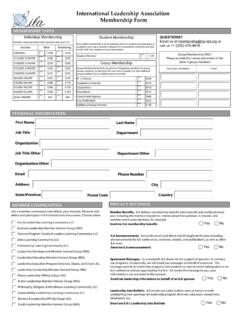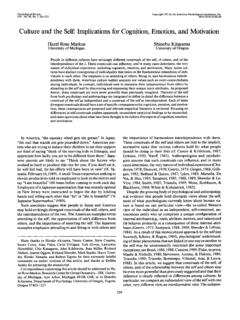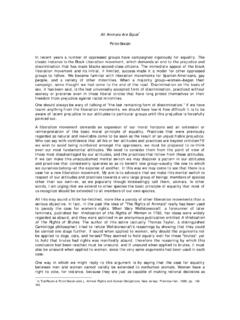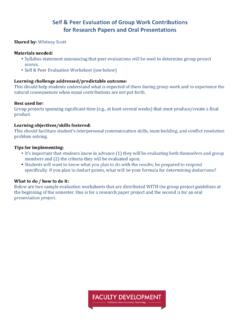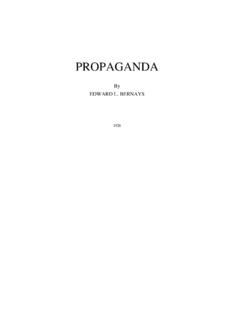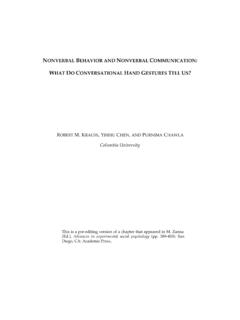Transcription of Ethics and Leadership Effectiveness
1 302 Ethics and LeadershipEffectivenessJoanne B. CiullaThe moral triumphs and failures of leaders carry a greater weight andvolume than those of nonleaders (Ciulla, 2003b). In Leadership we seemorality magnified, and that is why the study of Ethics is fundamental toour understanding of Leadership . The study of Ethics is about human is about what we should do and what we should be like as human beings, asmembers of a group or society, and in the different roles that we play in life. It isabout right and wrong and good and evil. Leadership is a particular type of humanrelationship. Some hallmarks of this relationship are power and/or influence,vision, obligation, and responsibility.
2 By understanding the Ethics of this relation-ship, we gain a better understanding of Leadership , because some of the centralissues in Ethics are also the central issues of Leadership . They include the personalchallenges of authenticity, self-interest, and self-discipline, and moral obligationsrelated to justice, duty, competence, and the greatest of the most perceptive work on Leadership and Ethics comes from old textsand is out there waiting to be rediscovered and reapplied. History is filled with wis-dom and case studies on the morality of leaders and Leadership . Ancient scholarsfrom the East and West offer insights that enable us to understand Leadership andCHAPTER 13 Author s Note: A special thanks goes to Jepson School research assistant Cassie King for herhelp in preparing this 11/26/03 5:38 PM Page 302formulate contemporary research questions in new ways.
3 History and philosophyprovide perspective on the subject and reveal certain patterns of Leadership behaviorand themes about Leadership and morality that have existed over time. They remindus that some of the basic issues concerning the nature of Leadership are inextricablytied to the human study of Ethics and the history of ideas help us understand two overarchingand overlapping questions that drive most Leadership research. They are: What isleadership? And what is good Leadership ? One is about what Leadership is,or adescriptive question. The other is about what Leadership ought to be,or a normativequestion. These two questions are sometimes confused in the literature.
4 Progress inleadership studies rests on the ability of scholars in the field to integrate the answersto these questions. In this chapter, I discuss the implications of these two questionsfor our understanding of Leadership . I begin the chapter by looking at how theethics and Effectiveness question plays out in contemporary work on leadershipand Ethics and I discuss some of the ethical issues distinctive to Leadership . ThenI show some of the insights gleaned from the ancient literature and how theycomplement and provide context for contemporary research. In the end I suggestsome directions for research on Ethics and in Leadership and MoraleBefore I get started, a short note on the words ethicsand moralis in order.
5 Somepeople like to make a distinction between these two concepts, arguing that Ethics isabout social values and morality is about personal values. Like most philosophers,I use the terms interchangeably. As a practical matter, courses on moral philosophycover the same material as courses on Ethics . There is a long history of using theseterms as synonyms of each other, regardless of their roots in different languages. InDe Fato( ) Cicero substituted the Latin word moralefor Aristotle s use of theGreek word see the two terms defining each other in the Oxford word moralis defined as of or pertaining to the distinctionbetween right and wrong, or good and evil in relation to the actions, volitions, orcharacter of human beings; ethical, and concerned with virtue and vice or rules ofconduct, ethical praise or blame, habits of life, custom and manners (CompactOxford English Dictionary, 1991, p.)
6 1114). Similarly,ethicsis defined as of or per-taining to morality and the science of morals, the moral principles by which aperson is guided (Compact Oxford English Dictionary, 1991, p. 534). Ethics as Critical TheoryIn 1992, I conducted an extensive search of literature from psychology, sociology,anthropology, political science, religion, and philosophy to see what work had beendone on Ethics and Leadership (Ciulla, 1995). The results were disappointing both interms of the quantity and quality of articles in contemporary books and and Leadership Effectiveness 11/26/03 5:38 PM Page 303 This is not to say that prominent Leadership scholars have ignored the subjector failed to see the importance of Ethics to Leadership .
7 What I am saying is thatphilosophers who specialize in Ethics see their subject differently than do socialscientists. Studies of charismatic, transformational, and visionary Leadership oftentalk about Ethics . In these studies, Ethics is part of the social scientist s descriptionof types or qualities of leaders and/or leader behaviors. From a philosopher s pointof view, these studies offer useful empirical descriptions, but they do not offerdetailed critical analysis of the Ethics of Leadership . The study of Ethics in any field,such as business or law, also serves as a critical theory. Philosophers usually ques-tion most of the assumptions in the field (which might explain why people oftentry to serve them hemlock!)
8 My point here is not that philosophy is better than thesocial sciences, but that it brings out different aspects of Leadership by employingdifferent methods of analysis. If we are to gain an understanding of Ethics and lead-ership, we will need both kinds of research and and UnderstandingThe other striking thing I observed about the Leadership literature was thatwriter after writer complained that researchers did not seem to be making muchprogress in their understanding of Leadership (J. G. Hunt, 1991). Fortunately, I willnot be adding my voice to that chorus of lamentation. Many things have changedin Leadership studies since the early 1990s.
9 Several initiatives are afoot to pullresearch together. The full-range Leadership theory consolidates research ontransformational and charismatic Leadership theories and research with empiricalfindings on Leadership behaviors (Antonakis & House, 2002). Also, more scholarsfrom the humanities have entered the field, and more Leadership scholars are doinginterdisciplinary work. This is a substantial development because the humanitiesgive us a different kind of knowledge than do the sciences and social humanities provide a larger context in which we can synthesize what weknow about Leadership . This context also shows us patterns of Leadership that wecan use to analyze contemporary problems.
10 The challenge for today s leadershipscholars is how to bring the two together. As C. P. Snow noted in his famous 1959 Rede lecture, there are two cultures of scholars, the humanities and the naturalsciences. He said the sciences provide us with descriptions and explanations, but weneed the humanities for understanding (Snow, 1998). Similarly, in 1962 Bennisobserved that the sciencepart of social science is not about the data the scientistsproduce, nor is it barren operationalism what some people refer to as scientism or the gadgetry used for laboratory work. Rather it is what may be called the sci-entific temper or spirit (Bennis, 2002, pp.)
